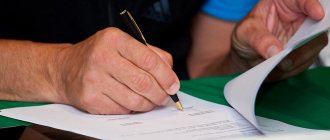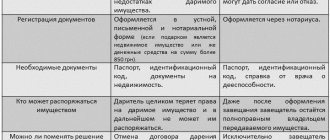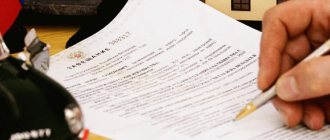The death of a citizen is accompanied by the transformation of the remaining property assets into an inherited estate awaiting heirs. How to find out whether there is an inheritance at all, and whether the will of the deceased was expressed regarding the desired owner? Theoretically, the deceased could donate or alienate property during his lifetime. Obtaining information and the procedure for entering into an inheritance are limited by deadlines, the omission of which is fraught with the loss of property rights even if there is an expression of the will of the testator.
How to find out that you have become an heir?
According to Article 1113 of the Civil Code of the Russian Federation, the grounds for opening an inheritance, and therefore for the heirs to have the right to enter into it, are:
- Death of a citizen who is a testator.
- Making a court decision to declare the testator dead.
Acceptance of inherited property is possible immediately after the death of a close relative or after a court decision is made to recognize the giver as deceased. From the date of death or recognition by the court of the fact of death, within six months, all applicants consisting of relatives and beneficiaries under the will must formalize their rights to inheritance.
It is possible to carry out inheritance both through a notary’s office and by establishing the actual acceptance of inherited property (Article 1153 of the Civil Code of the Russian Federation). You must use one of the methods within six months (Article 1154 of the Civil Code of the Russian Federation).
How can you find out about the existence of an inheritance? It is possible to determine the volume of the inheritance mass, your rights to it and register them only in the notary office at the place of last residence of the deceased (by registration). The successor can submit a request to the notary about the availability of the property left behind and write a statement about its acceptance.
But finding out that the testator has died and the inheritance case has been opened is not so easy. As a rule, after the death of a citizen, his relatives inform the lawyer about all possible applicants and provide the specialist with their contacts. In such a situation, the notary himself can call the heirs.
If the heir does not communicate with his relatives, then it will be difficult to find out about the death of his loved one. It is best to keep in touch with your loved ones.
Is it possible to determine whether there has been a refusal of a will, and how to do this?
At the highest state level, it is established that heirs have the right to refuse to receive an inheritance at any time. If a refusal to receive material assets occurs, it will be possible to find out about the case of refusal only from the user himself, who has decided to cancel his inheritance claims.
The notary has no right to notify other heirs under the will about the refusal of one of them from material resources. The exception will be situations when the “refusenik” gives his permission to publish information. In all other situations, it will be possible to find out about the refusal only during the publication of the document.
Is there an inheritance?
The inheritance may include the personal belongings of the deceased, his real estate, cars and other property. Successors can also inherit bank deposits, shares in LLCs and other forms of business. As a rule, it is possible to find out about the size of the inheritance estate from documents kept by the giver.
Remember: the testator’s debts, for example, for taxes, utilities or loans, are also subject to inheritance. By accepting entry, applicants must assume responsibility for the obligations of the deceased in the amount of the value of the inheritance received (Article 1175 of the Civil Code of the Russian Federation).
If there are no documents about any property or there are guesses about this or that property, the successors can contact the notary with a request to determine the volume of the inheritance mass. The specialist has the right by law to send notarial requests to the registers in order to clarify the possessions of the deceased.
Will: where to look for it
As a rule, acceptance of an inheritance in Russia occurs according to the law, which means determining the rights to enter only among the blood relatives of the giver. How to find out the heirs of the deceased?
According to the law, all relatives who belong to one of the seven order of entry can apply for membership. In the absence of all successors, the property of the deceased person will be recognized as an escheat and transferred to the benefit of the municipality.
The second type of determination of the rights to receive an inheritance is a will, which the testator can draw up during his lifetime in a notary’s office and give it the right of inheritance to any person. Applicants for receiving property under a will can be both relatives of the giver and his friends, colleagues or common-law spouses.
How to find out the heirs of a deceased person under a will? It is impossible to do this during the life of the testator, since according to the law, the notary has no right to disclose confidential information to strangers, including relatives of the author of the document. It is possible to find out about your right of inheritance only after the death of the testator from a notary who will open the inheritance case.
Finding a will is not that difficult. After the death of a loved one, any friend or relative has the right to contact any notary in order to clarify information about the existence of a will. The lawyer has a database through which heirs can obtain information about the existence of a will.
Possibility of challenging a document
Like any document, a will can be challenged. But how can you find out whether there is an inheritance and whether the will is valid? To recognize a document as legal, it must be drawn up without errors and taking into account all legal norms. You should also exclude the possibility:
- declaring the testator incompetent;
- drawing up a will under any pressure (this includes mental and physical violence, as well as blackmail and threats);
- the testator being under the influence of alcohol or drugs, in a state of shock or affect at the time of execution of the document.
Challenging a will is only possible through the court if there are sufficient grounds. It should be borne in mind that it is possible to challenge not only the entire document, but also certain parts of it.
Thus, every potential heir has the opportunity to obtain information about the existence of a will. The procedure will not cause unnecessary trouble if you know exactly how to proceed. The main thing is to comply with the deadlines for declaring your authority to receive property. If they are observed, the next step in entering into an inheritance will be to register your rights to it.
How to check an inheritance if there is no will?
The first and fairly obvious recommendations are to simply not forget about your relatives, contact them from time to time, take an interest in their health and marital status, and meet at least once a year in order to support a relative if necessary.
Such an approach will not only allow the formation of healthy relationships between close people, but will also eliminate the need to double-check relatives who suddenly decided to hide the fact of the testator’s death in order to avoid competition among the heirs.
If, nevertheless, it was not possible to reach an agreement between the families, then you can obtain the necessary information at the notary’s office at the address where the deceased previously lived. In this case, interested parties need to have a number of documents with them, namely:
- identification. As a standard, a passport of a citizen of the Russian Federation is sufficient, but other options permitted by law can still be used;
- written confirmation of the death of the testator. This is usually the death certificate or a copy of it. In some cases, a court decision is used to declare a person dead;
- proof of relationship with the deceased testator. This may include: a child’s birth certificate, adoption decree, marriage certificate, etc.
How to check an inheritance if there is a will?
It is impossible to establish the fact of the existence of a will during the life of a relative, unless he himself decides to inform the citizen, since according to the law, all persons who were present during the execution of a written expression of will do not have the right to disclose information about the contents of the document, or even about the fact of its preparation. Both the notary, the translator, and the witnesses must keep information secret until the day the inheritance is opened. Therefore, information can only be obtained after the death of the testator.
According to the law, the notary must notify the heirs specified in the will of the fact of the death of the testator and their right to the property. But it is quite possible that he will not be able to contact the heir due to the lack of contact information. Therefore, when receiving information about the death of a relative, a citizen must adhere to the following sequence of actions:
- Independent search in a relative’s apartment. If you have access to the deceased's home, you should carefully examine all the places where the deceased could have left a document - it is quite possible that the will may end up where important papers are kept. Close persons living with the testator are usually aware of this. However, they are often heirs at law, so they may be interested in ensuring that a will is not found. Unfortunately, it is not uncommon when they try in every possible way to hide the existence of a written expression of will.
- If the search does not produce results, you will have to contact the notary office at the place of registration of the testator. In this case, you need to have with you the same documents that are necessary in case of clarifying information on an inheritance sought by law. As a standard, the notary who serves the area where the deceased lived is responsible for conducting all inheritance matters.
What is noteworthy is that searches can be complicated by permissible provisions of the law, because according to the norms, a will can be certified not only by a notary, but also by the chief doctors of medical institutions, heads of nursing homes and other competent persons. Typically, these options are used if a citizen is in serious condition and cannot visit the office on his own or does not have the opportunity to call a notary at home.
Searching for the will of a deceased person's home
The simplest and most effective way to find out whether a will has been drawn up is to simply look for it among the documents of the deceased. As a rule, it is stored immediately along with documents establishing the right to ownership of the transferred property. If the will was not found along with the general package, then look for it from close relatives, trustees or the lawyer of the deceased.
Pay special attention to whether the deceased had a safe deposit box at the bank. Often those documents are stored there, the security of which is of particular importance. Therefore, look for the will there . However, permission to open a cell will first need to be obtained. To do this, contact the administration or directly the management of the bank itself for help.
Is it possible to check inheritance by last name online for free?
Checking the existence of an inheritance and the possibility of obtaining the property of the testator can be carried out exclusively in cooperation with a notary with the provision of a package of mandatory documents to confirm the legal right.
Doing this online was problematic until May 2020. Then, through Internet resources, it was only possible to obtain advisory support on issues related to rights, features of the registration procedure and confirmation of the legality of inheritance. There were also some illegal and not very reliable services that offered information for a fee.
Now, on the official website of the Federal Notary Chamber, you can clarify whether an inheritance case has been opened after the death of a particular person. At the same time, information is provided: which notary is responsible for the review, the contact phone number of the specialist and the address of the office location.
To use the service, you must enter the last name, first name and patronymic of the testator - in exactly that order, since otherwise the system will give an incorrect result: the case has already been opened, but it is not on the website. You may also need the date of birth and death, but in fact these data are not mandatory.
Anyone can now obtain information on open inheritances - just enter information about the deceased. However, information about the heirs remains unavailable. What is important is that during a person’s life it is impossible to clarify through the service whether there is a will or not - confidentiality in this case is maintained.
The online method is quite convenient, but it is still recommended to additionally use standard options if the site does not provide information, since the service was introduced recently, so errors in data processing are possible.
Where to start
When deciding how to find out whether a deceased relative has a will, you should keep in mind that two copies are always prepared. One of them is kept by the testator, the other remains with the notary who executed the document. In order for a lost will to come into force, it is enough to find any of them.
The place where you should start your search is the testator’s house. As a rule, the testator keeps a document expressing his last will in his personal papers. Relatives living in the same house as the testator may be aware of its existence. However, when trying to find out from them whether a will exists or not, you should take into account that they are first-degree relatives of the deceased, which means they will receive the property if the lost will is not found. Therefore, you should not rely too heavily on them when trying to find this document.
How to find out if there is an inheritance abroad?
In a situation where a written expression of will is properly executed, the notary who is responsible for conducting the inheritance case is obliged to contact all the persons indicated in the document. The usual contact details are indicated there.
This is also done by special departments whose activities include checking and opening inherited property abroad. With the help of such colleges, any citizen can obtain information: whether he has inherited property abroad. Among other things, these institutions provide services for finding heirs to transfer the relevant certificate to them.







